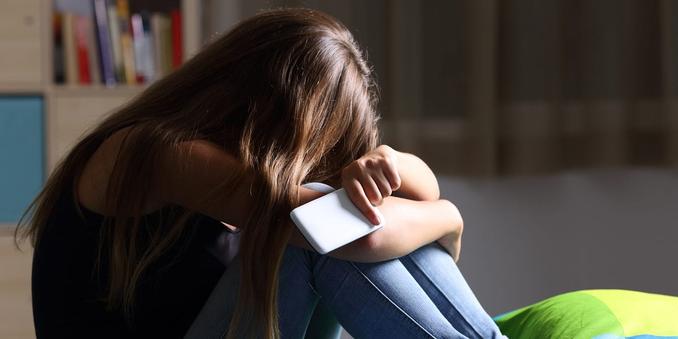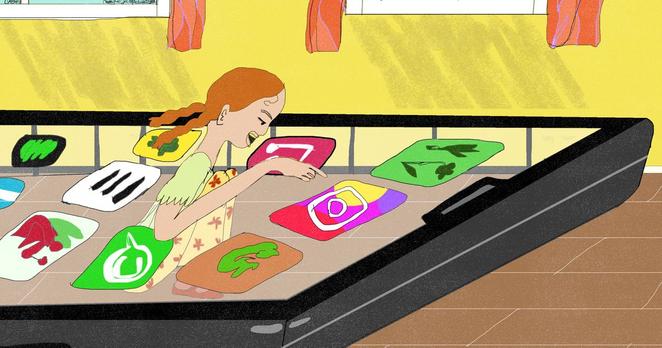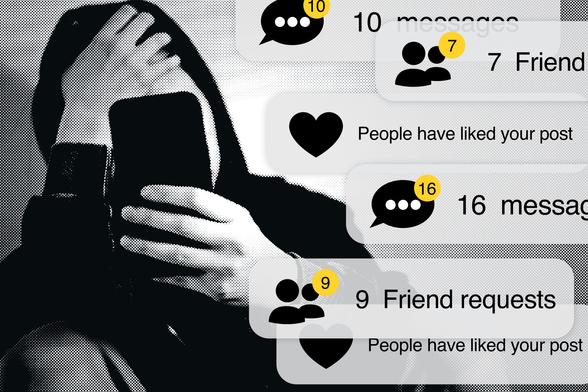So, personally, I think the problem started when parents started using television sets as babysitters. And yeah. I had a TV (black and white) in my room at probably too young an age, and a landline when I was 16. Nowadays, I use a computer when I want to go online, and only use my smartphone for important calls/texts, and identifying birds and plants. I don't understand folks who are staring at their phones 24/7, and ignoring the world around them. It's been going on for a while now...
When Kids Are Addicted to Their Phones, Who is to Blame?
By Kathryn Jezer-Morton
Mar. 30, 2024
Excerpt: "While reading #JonathanHaidt’s recent long, evidence-filled manifesto in The Atlantic, 'End the Phone-Based Childhood Now,' I began to think about how this line of thinking has become costly to ignore. (Haidt’s book on which the article is based, The Anxious Generation: How the Great Rewiring of Childhood Is Causing an Epidemic of Mental Illness, came out on March 26.) He argues that indicators of childhood well-being in developed nations began precipitously decreasing at exactly the same time that smartphones became widely available. He argues, thoroughly, that these falling indicators can’t be linked to any one nation’s problem — instead, it’s the common denominator we all share. It’s not America and its guns. It’s not South Korea and its pressure on young people to test into professions. It’s everywhere, and it’s the phones.
"There is nuance to Haidt’s evidence, even though it is overwhelmingly making a simple, unambiguous argument. He identifies two entwined causes of the decline in young people’s mental health and well-being: parents’ increased protectiveness of their children and children’s increased access to smartphones. It’s not the fault of video games or even social media per se. (Millennials came of age with video games with no measurable harm done, and younger millennials came of age with social media in the desktop era — no lasting scars but for the embarrassing Facebook pics from 2007.) The problem is in the mobility of the technology. It’s the affordances of privacy and portability, and the access to these affordances, that parents have given their children.
"Ultimately, what Haidt is implying, with the utmost tact, is that we parents need to start acting differently. Our kids’ reliance on mobile devices to pass the time starts long before high school, and it coalesces into an unshakeable habit under our watch — or, rather, while our gaze is averted and we’re looking at our phones. No legislation, no industry-oversight panel, is going to help us. Apple’s and Google’s executives know enough to withhold mobile devices from their kids, but they’re not going to stop selling them to ours.
"What Haidt doesn’t say is that parents can’t change their kids’ relationships with their phones and tablets without also addressing their own. Criticizing parents is very treacherous for any public figure, so it’s understandable that Haidt would avoid doing so.
"People with very strong opinions about parenting are usually pushing a skewed ideological agenda and are best ignored. A 'screen-free childhood'? Sounds precious. No thanks! Haidt may be an over-50 white guy, but he is not making an ideological argument in this book. His suggestions are realistic, and his argument is not shrill. We’re beyond moral panic. I know many children who are absolutely addicted to their mobile devices, whether we’re talking about a Nintendo Switch, a phone, or an iPad. This circumstance is normal now — so normal, in fact, that you’d be rude and tasteless to remark on it. Our social norms have been very quickly reshaped around this behavior. Kids who aren’t on iPads at the restaurant are the ones who get remarked on, not those who are.
"It’s a lot like any other kind of addiction: We’ve learned to tread very lightly around it, to explain it away. But unlike adults who live with addiction, children are not responsible for themselves. They can reasonably expect their parents to take responsibility for them, at least until high school. (At which point even Haidt says they get to have phones, so all bets are off!)
"The impossible condition of parenting is part of what has gotten us here. Parents work too much, and there is no affordable care infrastructure anywhere. It is inevitable for many parents to be working while trying to care for young children. But we do a lot more on our phones than work. It’s where we socialize and stay in touch, and the inflated amount of time we spend texting alone is a monopolizing factor. Is it possible that we have reached peak texting? Would it be possible for us to text less? I am nauseated at the thought of texting more — I truly hope we’ve hit our limit, but who am I kidding? We are at least as addicted to our phones as our kids are; we need them in order to relax. And since we don’t feel safe letting our kids wander around the neighborhood freely while we scroll in peace, we keep them inside with us, scrolling.
"It’s not just the parents who can’t afford child care whose children are addicted to their phones by age 10. Many parents of means and privilege rely on phones to keep their kids 'happy' to a degree that is — and here I’m going to break the No. 1 rule of parenting writing and shame people — totally gratuitous and lazy. I would be very interested to read a study of parents explaining why they have their children eat dinner in front of an iPad: For many people it’s exhaustion at the end of a long day, but for others it’s an unwillingness to deal with the challenging task of teaching your kids how to act. People tether their children to iPads so as to streamline and optimize their own lives, to avoid meltdowns and chaos. Everyone can be engaged in a semblance of respectable pantomimed productivity through their individual screens, and peace can reign. No messes, no fighting, no whining."
Full article:
https://www.thecut.com/article/children-teen-smartphone-addiction-what-to-do.html
#Internet #InternetCulture #MentalHealth #MentalWellbeing #Teenagers #Parenting #MeaningfulConnections #TechAddiction
#SmartPhones are #DumbingUsDown
#MoreGreenTimeLessScreenTime




